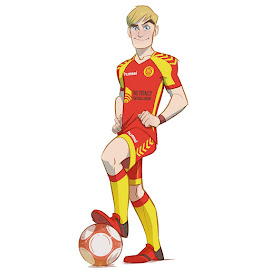Roy Race schooled you in the romance of the game – the little guy always has a chance against the big guy.
http://www.theguardian.com/football/blog/2009/sep/16/roy-race-comic-book-heroes
Compared with the dauntless Union Jack Jackson and D-Day Dawson,
the pre-eminent 70s comic book heroes who were still fighting the
second world war more than 30 years after it had ended, football's
cartoon luminary, Roy Race, the eponymous hero of Roy of the Rovers,
always came across as being a bit wet. The copy of his starring vehicle
that came with this newspaper on Monday captured the ageless Melchester
centre-forward and sometime player-manager in his early 80s peacock
pomp. But despite the voguish cliffhanger plot – a straight rip-off from
Dallas – to those of us who grew up with him Race always epitomised
Corinthian values and the fundamental moral steadfastness of the British
game.
Latterly he may have had the look of a maverick – all Sean Bean centre-parting and rakishly double-breasted blazer – but apart from the odd fit of pique when provoked by dishonourable directors or unscrupulous and possibly garlic-breathed foreigners, Race remained the quintessential goody-goody who always did the right thing. The stories were full of cliches but Race was the calm centre of an ever more tempestuous game and gave many children an entry into the lore of football.
I was glad, too, to be reacquainted with Johnny Dexter, aka the Hard Man, and his rotund coach Victor Boskovic, the epitome of the martinet manager, because it reminded me that the comic occasionally escaped its nostalgic roots. Boskovic's features seemed to be modelled on Wilf McGuinness after his hair fell out, but in his manner he was pure Brian Clough with a dash of José Mourinho.
While Race and the majority of his co-stars were a throwback to a more innocent age, the issues affecting the game in the 70s and 80s were tackled head on by Boskovic. The manager's chilling warning to the Danefield fans – "Just let one of you cause any trouble and I will make sure you never want to see a football match anywhere ever again" – bristles with genuine menace and reflects a time when some in the game were advocating the birching of hooligans, preferably on the pitch at half-time.
He wasn't the only one who broke free of the past. Scoop's Jon Stark, match-winner for hire, heralded some of the traits of the modern player. Here was a self-styled "soccer mercenary" who was self-employed, accepted no fee if the team that hired him lost but charged £1,000 a victory and £250 a goal in a winning cause. Cherished by fans and hated by chairmen, he was the first footballer of fortune and may have been a visionary. Who can say that the days when players sell their loyalty in 90-minute portions will never dawn?
Comics provided my first football lessons but by the time I was 11 they had been usurped by a more serious publication, Football Handbook. With its in-depth profiles and tactical features, the piecework magazine gave the young supporter a football education alongside trying to sell you binders. Indeed, armed only with its chalkboard-style reproduction of goals and a library copy of Malcolm Allison's Soccer for Thinkers you had all the tools required to deconstruct the game and become an insufferable know-all.
Yet, although Roy of the Rovers and its imitators were juvenile in comparison to the more erudite pamphlet, the myth-making did have a profound effect. Shoot! and Match, whose glossy pages festooned many a bedroom wall, were preoccupied with the present and the attempt to make celebrities of footballers whose life's ambition was to meet Barbra Streisand. Roy Race schooled you in the romance of the game – no cause was ever truly lost, the little guy always has a chance against the big guy and dogged endeavour will always bring its own rewards. Without it there would have been no How Steeple Sinderby Wanderers Won the FA Cup and perhaps not even fictional football's Everest – Ripping Yarns' Golden Gordon.
Apart from Foul and the Football League Review, there was little to sustain the adult supporter. Children had Blackie Gray, Hot Shot Hamish and Nipper Lawrence every week to hook them in and nurture a lifelong love. Roy of the Rovers never really recovered from being mercilessly and hilariously parodied in Viz's Billy the Fish, which highlighted the clash between its out-of-date values and the ever-more convoluted story lines that tried to make it exciting for a dwindling audience. But the spoof was funny because of the affection the original had inspired.
Now, when children are being priced out of going to games and with magazines and TV programmes aimed at an older audience, the strip's demise in 1995 after 41 years severed a link between young supporters and football, one that clubs may yet come to mourn with future generations. That is why his fleeting reappearance this week is more than a dose of retro-kitsch sentimentality. Of course it is anachronistic, it always was, but its fate is a real shame.
Latterly he may have had the look of a maverick – all Sean Bean centre-parting and rakishly double-breasted blazer – but apart from the odd fit of pique when provoked by dishonourable directors or unscrupulous and possibly garlic-breathed foreigners, Race remained the quintessential goody-goody who always did the right thing. The stories were full of cliches but Race was the calm centre of an ever more tempestuous game and gave many children an entry into the lore of football.
I was glad, too, to be reacquainted with Johnny Dexter, aka the Hard Man, and his rotund coach Victor Boskovic, the epitome of the martinet manager, because it reminded me that the comic occasionally escaped its nostalgic roots. Boskovic's features seemed to be modelled on Wilf McGuinness after his hair fell out, but in his manner he was pure Brian Clough with a dash of José Mourinho.
While Race and the majority of his co-stars were a throwback to a more innocent age, the issues affecting the game in the 70s and 80s were tackled head on by Boskovic. The manager's chilling warning to the Danefield fans – "Just let one of you cause any trouble and I will make sure you never want to see a football match anywhere ever again" – bristles with genuine menace and reflects a time when some in the game were advocating the birching of hooligans, preferably on the pitch at half-time.
He wasn't the only one who broke free of the past. Scoop's Jon Stark, match-winner for hire, heralded some of the traits of the modern player. Here was a self-styled "soccer mercenary" who was self-employed, accepted no fee if the team that hired him lost but charged £1,000 a victory and £250 a goal in a winning cause. Cherished by fans and hated by chairmen, he was the first footballer of fortune and may have been a visionary. Who can say that the days when players sell their loyalty in 90-minute portions will never dawn?
Comics provided my first football lessons but by the time I was 11 they had been usurped by a more serious publication, Football Handbook. With its in-depth profiles and tactical features, the piecework magazine gave the young supporter a football education alongside trying to sell you binders. Indeed, armed only with its chalkboard-style reproduction of goals and a library copy of Malcolm Allison's Soccer for Thinkers you had all the tools required to deconstruct the game and become an insufferable know-all.
Yet, although Roy of the Rovers and its imitators were juvenile in comparison to the more erudite pamphlet, the myth-making did have a profound effect. Shoot! and Match, whose glossy pages festooned many a bedroom wall, were preoccupied with the present and the attempt to make celebrities of footballers whose life's ambition was to meet Barbra Streisand. Roy Race schooled you in the romance of the game – no cause was ever truly lost, the little guy always has a chance against the big guy and dogged endeavour will always bring its own rewards. Without it there would have been no How Steeple Sinderby Wanderers Won the FA Cup and perhaps not even fictional football's Everest – Ripping Yarns' Golden Gordon.
Apart from Foul and the Football League Review, there was little to sustain the adult supporter. Children had Blackie Gray, Hot Shot Hamish and Nipper Lawrence every week to hook them in and nurture a lifelong love. Roy of the Rovers never really recovered from being mercilessly and hilariously parodied in Viz's Billy the Fish, which highlighted the clash between its out-of-date values and the ever-more convoluted story lines that tried to make it exciting for a dwindling audience. But the spoof was funny because of the affection the original had inspired.
Now, when children are being priced out of going to games and with magazines and TV programmes aimed at an older audience, the strip's demise in 1995 after 41 years severed a link between young supporters and football, one that clubs may yet come to mourn with future generations. That is why his fleeting reappearance this week is more than a dose of retro-kitsch sentimentality. Of course it is anachronistic, it always was, but its fate is a real shame.
http://www.theguardian.com/football/blog/2009/sep/16/roy-race-comic-book-heroes














Δεν υπάρχουν σχόλια:
Δημοσίευση σχολίου